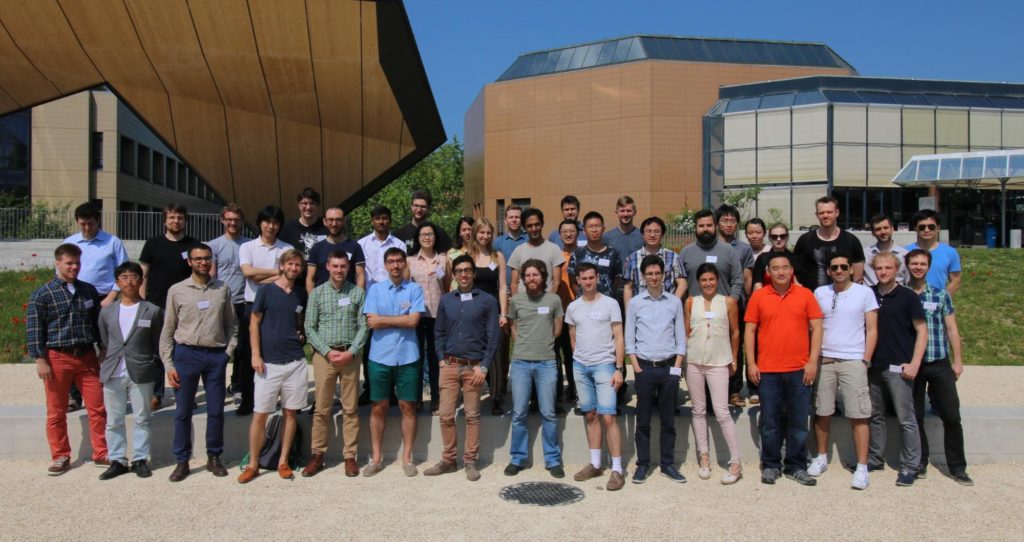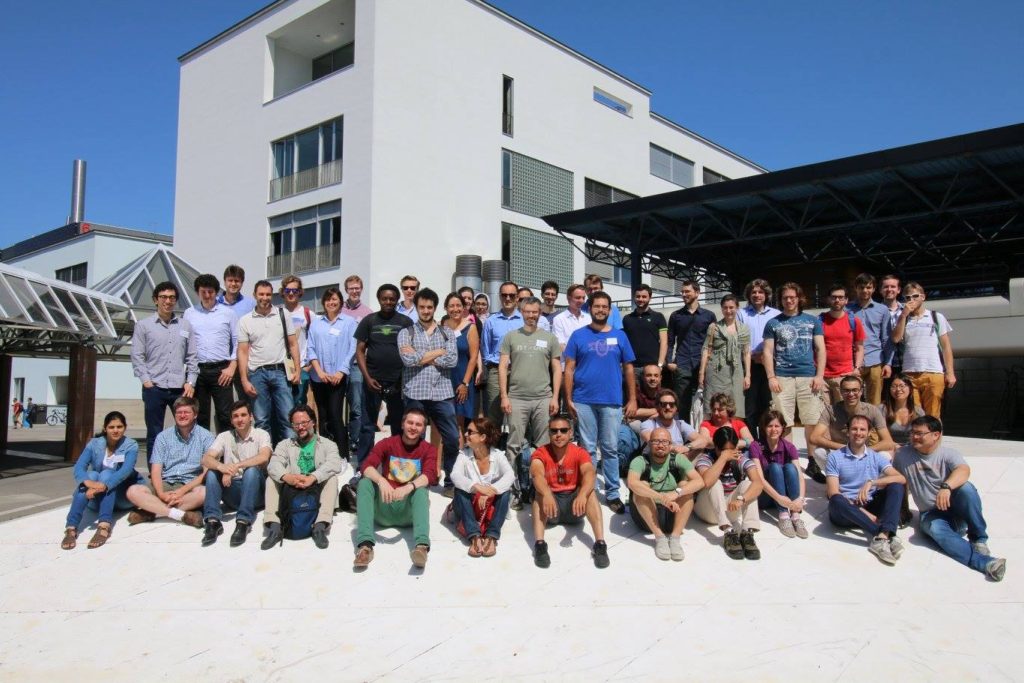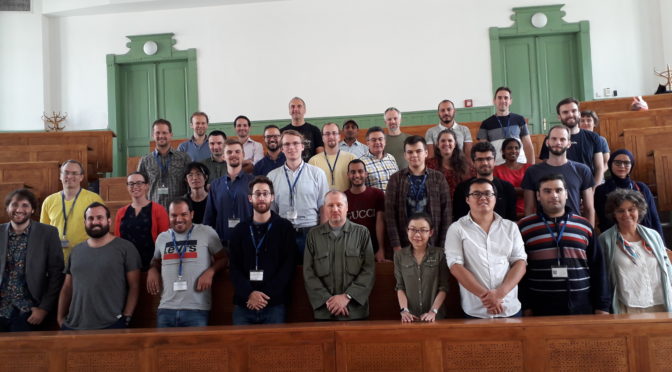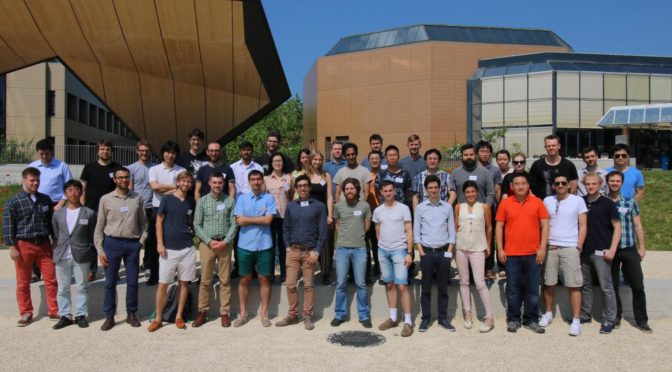Objectives:
The aim of the school was to give a comprehensive introduction to the theoretical and practical aspects of the electronic excitations that are probed by experimental techniques such as optical absorption, EELS and photoemission (direct or inverse). From a theoretical perspective, excitations and excited state properties are out of the reach of density-functional theory (DFT), which is a ground-state theory. Over the past three decades, alternative ab-initio theories and frameworks capable of describing electronic excitations and spectroscopy, have gained popularity including time-dependent density-functional theory (TDDFT) and many-body perturbation theory (MBPT) or Green’s function theory (GW approximation and Bethe-Salpeter equation BSE). In fact, computational solutions and codes have been developed to implement these theories and to provide tools to calculate excited state properties. The present school focused on these points, covering theoretical, practical, and also numerical aspects of TDDFT and MBPT, non-linear response and real-time spectroscopies. Additionally, the school provided valuable insights from an experimental perspective on spectroscopies and magnetic excitations, rarely covered in similar events. Finally, a large part of the school was devoted to getting familiar with the codes that implement such theories (ABINIT, 2Light, Lumen, DP, and EXC). Continue reading Report for Theoretical Spectroscopy Lectures 2024
Tag Archives: tutorial
Report on the “ML-IP 2021” workshop (Young and Early-career Researchers’ Tutorial on Machine Learning Interatomic Potentials)
Machine learning potentials have now established themselves as a method of choice in many atomistic simulation projects. This tutorial workshop was aimed at young and early-career researchers who are interested in using machine learning potentials in their work, but are unsure of where to start or of how feasible the proposed application would be.
While the field continues to produce new theoretical and methodological advances, there is now a large class of systems that can be treated with existing, established methods. The main issues now for new researchers entering the field are, first, choosing between the many different machine learning methods (and correspondingly many software packages) available, and second, learning about simulation workflows and best practices that are often undocumented, unwritten “common knowledge”.
The workshop was designed with two main aims: First, to give these researchers a solid introduction in the basic scientific techniques of designing, fitting, and validating a machine learning potential for a new system. Second, to provide a platform for young researchers interested in using machine learning potentials in their work to connect to those involved in developing methods for machine learning potentials, in order to accelerate the adoption of machine learning techniques in the wider atomistic simulation community. Continue reading Report on the “ML-IP 2021” workshop (Young and Early-career Researchers’ Tutorial on Machine Learning Interatomic Potentials)
Report on “ABINIT school on ground state and linear response properties”
Location: Czech Technical University, Prague, Czech Republic
Webpage: http://palata.fzu.cz/abinitschool/index.php?item=home
Dates: 2-9 September 2019.
Organizers: Eric Bousquet (University of Liège), Jiří Hlinka (Institute of Physics, Czech Acad. Sci.), Sabine Koerbel (Trinity College Dublin), Ladislav Kalvoda (Czech Technical University), Marek Paściak (Institute of Physics, Czech Academy of Science), Pavel Márton (Institute of Physics, Czech Academy of Science).
Sponsors: Psi-k Network, Institute of Physics of the Czech Academy of Sciences, University of Liège and Czech Technical University.
The goal of this ABINIT school was to teach the capabilities of the code related to ground state crystal structures (electronic density, structure relaxation, collinear and non-collinear magnetism, polarization from Berry phase, NEB, MD), response to external fields (electric and displacement field, Zeeman magnetic field) and properties obtained from linear response density functional perturbation theory (DFPT: phonons, dielectric constant, elastic and piezoelectric constants, Born effective charges, non-linear electro-optical coefficients, Raman intensities). New postprocessing techniques and tools were also tough (qAgate, Abipy, phonon projections), a preliminary introduction to the MULTIBINIT second-principles code developed aside to ABINIT to perform larger scale MD and parallelization of the code were also given. Continue reading Report on “ABINIT school on ground state and linear response properties”
Scientific Report on the “2017 MARVEL/Psi-k/MaX tutorial on high-throughput computations: general methods and applications using AiiDA”
EPFL, Lausanne, Switzerland, 29-31 May 2017

High-throughput computing (HTC) is emerging as an effective methodology in computational materials science for the discovery of novel materials and the optimisation of selected properties. Its adoption is spreading rapidly at the point that HTC is becoming an essential tool for computational materials scientists.
The aim of the tutorial was to introduce young researchers and more experienced practitioners to HTC, with hands-on tutorials based on the open-source high-throughput platform AiiDA (http://www.aiida.net), complemented by four invited keynote talks to overview the diverse application fields of HTC.
We report here a summary of what has happened.
Scientific Report on the workshop: “MARVEL/MaX/Psi-k Tutorial on high-throughput computations: general methods and applications using AiiDA”
EPFL, Lausanne, Switzerland, 22-24 June 2016

High-throughput computing (HTC) is emerging as an effective methodology in computational materials science for the discovery of novel materials. Its adoption is spreading rapidly at the point that HTC is becoming an essential tool for computational materials scientists.
The aim of the tutorial was to introduce young researchers to HTC, with hands-on tutorials based on the open-source high-throughput platform AiiDA (http://www.aiida.net), complemented by three invited highlight talks to underscore the diverse application fields of HTC.
We report here a summary of what has happened.


